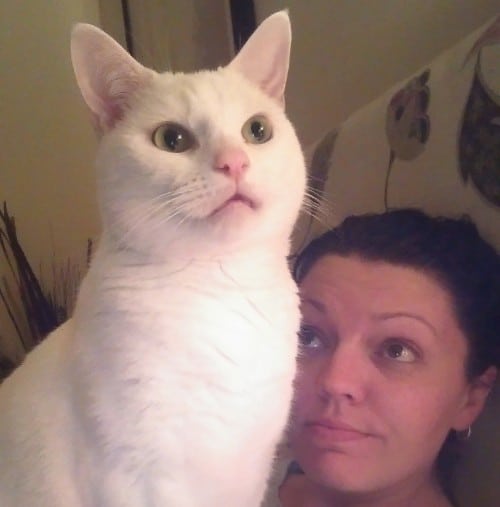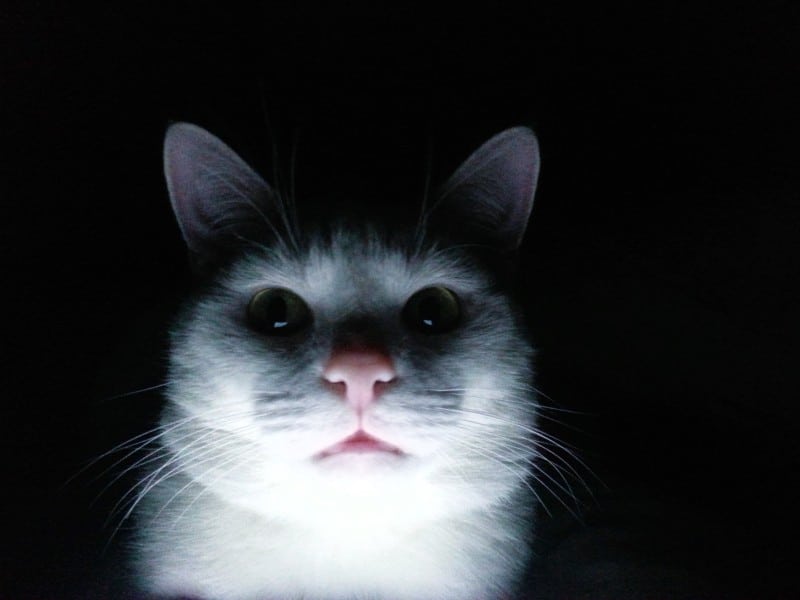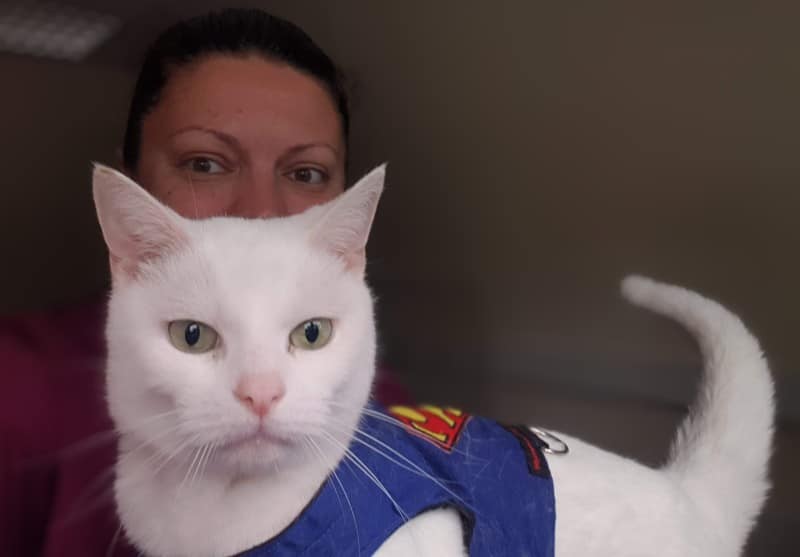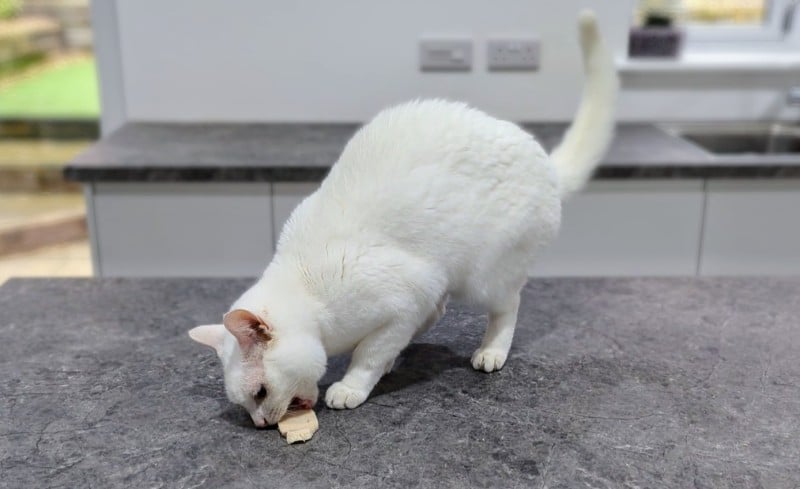The data is current and up-to-date in accordance with the most recent veterinarian research.
Learn more »
Hi, I’m Dr. Karyn! Read my introduction to learn more about me and meet my five hilarious cats: Clutch, Cyril, Alex, Zelda, and Zazzles.
That probably feels like a silly query, doesn’t it? After all cats need teeth!
But, what would occur in the event that they didn’t have any? Well, that was a matter I used to be faced with about my special little man, Clutch, five years ago.
We don’t know anything about Clutch’s kittenhood; he was a few 12 months old when he was brought into my veterinary practice, skinny, scabby, and in need of some TLC after fending for himself in a shopping mall automotive park for several months. When nobody got here forward to assert him, I discovered myself falling in love with this confident, sassy, affectionate fellow. After I castrated and chipped him, he got here home with me, where he has stayed for over nine years. Amongst the various things that were unique to Clutch was his little cheesy grin. His mouth sat open by just just a few millimeters, simply enough to get a peek at his little fangs and incisors, and it was cute. There was no obvious explanation for this gap, and he definitely had no trouble scarfing down food.
Clutch displaying his gap-mouthed cheesy grin
After about 4 years, I noticed that he began to look a bit sad, and wasn’t eating with such enthusiasm, which led me to have a superb look inside his mouth. What I discovered was that the gums around most of his teeth across the front of his mouth looked red and inflamed, and all 4 of his canine teeth (fangs) were a bit wobbly. It appeared that, over time, the constant exposure of his gums to the air had caused inflammation and weakening of the tooth roots.
Due to the way in which the gums had been affected, and since he was in pain, there was no other option than to get him in for a dental and extract all of the affected teeth, which was most of them. This sounds really awful, I do know, however it was a procedure I had performed dozens of times on cats with severe dental disease, and I knew how well they did after having their teeth out. I knew that Clutch would give you the option to eat without his teeth, I knew that he was fit and healthy, so there was minimal anesthetic risk, and I knew that it was one of the best option to treat his sore mouth.
I knew all this. I’m a vet in spite of everything, an expert. So why did my partner find me in tears, completely inconsolable, at 11 pm the night before his surgery?
Creepy Clutch together with his little gap
Dr Karyn the vet is a very different person to Karyn, the pet owner.
The conversation went just a little bit like this:
Reece: What’s mistaken? I believed he was just having teeth out?
Me: He’s.
Reece: But you do that every one the time. He’ll be advantageous! He’ll be higher with them out.
Me: I do know that.
Reece: You recognize higher than anyone that he’ll be okay.
Me: Yes, I do know that too.
Reece: ?
Me: I don’t know! It’s just different when it’s your personal! What if he’s not okay? What if he’s the rare case that doesn’t get up from anesthetic? What if he can’t eat?
I discovered myself stricken by all of the troubles and concerns that I’m normally helping my clients cope with, unable to hearken to my very own advice.
I used to be completely unprepared for the push of emotions that was hitting me, and I spotted that, in the case of treating my very own pet, logic and objectivity are out the door and catching a bus to the subsequent county. That is why doctors and vets should never operate on family members, and I used to be glad that I’d arranged for a colleague to perform Clutch’s dental.
As you may probably guess, Clutch’s surgery went flawlessly. His pre-anesthetic bloods were perfect, his anesthetic was smooth, and the problematic teeth got here out with little or no resistance, confirming that they really needed to be extracted. He was up and about in a short time, meowing loudly about his very empty stomach. Which brings me to our original query: Cats need teeth, don’t they?
Minus the gap, still gorgeous
Clutch’s Recent and Improved Toothless Appetite
Probably the most common observations I hear from owners after their cat or dog has had a dental is how a lot better their pet is eating.
“We didn’t realize how much his teeth were affecting him,” is a frequent comment.
“She seems happier than she has in months!” is one other.
It’s because, more often than not, if an animal’s teeth are causing them pain or discomfort, it’s normally been happening for lots longer than we realize. Cats specifically are very talented in the case of masking pain; just getting on with it until it becomes an excessive amount of for them to maintain up the act. That doesn’t make us bad pet parents, however it does mean that if our cat starts to indicate signs of dental problems, we’d like to take it seriously. If it’s bad enough that they’ll’t disguise it, it’s normally bad enough to want surgery.
So whenever you remove the source of that pain, the outcomes are sometimes dramatic, and almost fast.
I had prepared a supply of Clutch’s favorite roast chicken as a recovery treat, cut into little pieces that may very well be swallowed whole. Many individuals think that mushy, liquidy food is best after a dental, but that is more prone to get stuck within the gaps left by the extracted tooth roots; soft chunks are the option to go. And boy, did they go!
I believe if I’d filled his bowl to the brim with chicken, it might have been gone immediately. Clutch attacked every bit I offered with the ferocity of a ravenous velociraptor, and I used to be grateful that he now not had those sharp fangs! Inside just a few days, he was back to the sprightly, energetic character of six months ago. After per week, his gums had completely healed, and after two weeks, he had gained ten ounces. And, just like every other pet owner, I believed to myself: He’s happier than he’s been in months!
Clutch ❤️ Chicken (and nearly every part else!)
Clutch had been an enormous fan of cooked chicken before his dental, but now he was obsessed. Gone were the tiny bite-sized pieces; he was grabbing great big chunks and chomping away until there was nothing left. He was eating dry kibble too – he still has a few molars on the back to chew with, but more often than not, cats swallow the pieces whole anyway. Nevertheless it was the way in which that he was using his gums like teeth that was most impressive!
The opposite cats in our house, all in possession of full mouths of healthy teeth and gums, still refuse to eat chicken if it has not been shredded. Meanwhile, I’m quite certain that, if given the chance, Clutch would sink his lack-of-teeth into a complete roast chicken. In actual fact, just the opposite night he tried to make off with a complete pork rib! He’s also been known to bite off the top of a pizza slice, munch on a dropped corn chip, and just the opposite day he managed to steal a part of a pancake! We’ve got learned to be extra vigilant when Clutch and food are in the identical room, but I actually have to confess that his desperate attempts to grab treats and climb into the fridge are quite entertaining.
Clutch munching together with his gummy mouth
But, cats do need teeth, don’t they?
After all they do, and dental health and hygiene is an important a part of taking care of your feline companions. With the ability to check your cat’s teeth, and watching how they pick up, chew, and swallow their food, are easy and effective ways you could monitor their dental health. Along with that, having your vet perform a dental check every six to 12 months can assist discover and treat problems before they turn into severe.
Nonetheless, there are particular conditions and situations where cats must have multiple teeth removed; sometimes all of them. Should you end up in that situation, it is totally normal to feel stressed, anxious, and emotional – I’ve been there! But it is best to also know that in case your cat’s teeth are bad enough that they need to return out, you may almost guarantee that they’re going to feel 100% higher with them gone. And once the gums have healed and hardened, they might be just as effective as teeth, possibly even higher – just ask Clutch!






